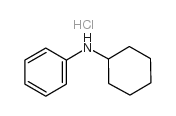N-CYCLOHEXYLANILINE HYDROCHLORIDE
Modify Date: 2024-01-14 22:04:16

N-CYCLOHEXYLANILINE HYDROCHLORIDE structure
|
Common Name | N-CYCLOHEXYLANILINE HYDROCHLORIDE | ||
|---|---|---|---|---|
| CAS Number | 64316-73-0 | Molecular Weight | 211.73100 | |
| Density | N/A | Boiling Point | 292.9ºC at 760 mmHg | |
| Molecular Formula | C12H18ClN | Melting Point | N/A | |
| MSDS | N/A | Flash Point | 135.5ºC | |
| Name | N-cyclohexylaniline,hydrochloride |
|---|---|
| Synonym | More Synonyms |
| Boiling Point | 292.9ºC at 760 mmHg |
|---|---|
| Molecular Formula | C12H18ClN |
| Molecular Weight | 211.73100 |
| Flash Point | 135.5ºC |
| Exact Mass | 211.11300 |
| PSA | 12.03000 |
| LogP | 4.30620 |
Synonym:N-Cyclohexylaniline hydrochlorid Section 2 - COMPOSITION, INFORMATION ON INGREDIENTS
Risk Phrases: None Listed. Section 3 - HAZARDS IDENTIFICATION EMERGENCY OVERVIEW
Not available. Potential Health Effects Eye: May cause eye irritation. Skin: May cause skin irritation. May be harmful if absorbed through the skin. Ingestion: May cause irritation of the digestive tract. May be harmful if swallowed. Inhalation: May cause respiratory tract irritation. May be harmful if inhaled. Chronic: Not available. Section 4 - FIRST AID MEASURES Eyes: Flush eyes with plenty of water for at least 15 minutes, occasionally lifting the upper and lower eyelids. Get medical aid. Skin: Get medical aid. Flush skin with plenty of water for at least 15 minutes while removing contaminated clothing and shoes. Ingestion: Get medical aid. Wash mouth out with water. Inhalation: Remove from exposure and move to fresh air immediately. Notes to Physician: Treat symptomatically and supportively. Section 5 - FIRE FIGHTING MEASURES General Information: As in any fire, wear a self-contained breathing apparatus in pressure-demand, MSHA/NIOSH (approved or equivalent), and full protective gear. Extinguishing Media: Use water spray, dry chemical, carbon dioxide, or chemical foam. Section 6 - ACCIDENTAL RELEASE MEASURES General Information: Use proper personal protective equipment as indicated in Section 8. Spills/Leaks: Vacuum or sweep up material and place into a suitable disposal container. Section 7 - HANDLING and STORAGE Handling: Avoid breathing dust, vapor, mist, or gas. Avoid contact with skin and eyes. Storage: Store in a cool, dry place. Store in a tightly closed container. Section 8 - EXPOSURE CONTROLS, PERSONAL PROTECTION Engineering Controls: Use adequate ventilation to keep airborne concentrations low. Exposure Limits CAS# 64316-73-0: Personal Protective Equipment Eyes: Not available. Skin: Wear appropriate protective gloves to prevent skin exposure. Clothing: Wear appropriate protective clothing to prevent skin exposure. Respirators: Follow the OSHA respirator regulations found in 29 CFR 1910.134 or European Standard EN 149. Use a NIOSH/MSHA or European Standard EN 149 approved respirator if exposure limits are exceeded or if irritation or other symptoms are experienced. Section 9 - PHYSICAL AND CHEMICAL PROPERTIES Physical State: Solid Color: white Odor: Not available. pH: Not available. Vapor Pressure: Not available. Viscosity: Not available. Boiling Point: Not available. Freezing/Melting Point: Not available. Autoignition Temperature: Not available. Flash Point: Not available. Explosion Limits, lower: Not available. Explosion Limits, upper: Not available. Decomposition Temperature: Solubility in water: Specific Gravity/Density: Molecular Formula: C12H18ClN Molecular Weight: 212 Section 10 - STABILITY AND REACTIVITY Chemical Stability: Not available. Conditions to Avoid: Incompatible materials. Incompatibilities with Other Materials: Acids, bases, strong oxidizing agents. Hazardous Decomposition Products: Hydrogen chloride, chlorine, nitrogen oxides, carbon monoxide, carbon dioxide, ammonia. Hazardous Polymerization: Has not been reported Section 11 - TOXICOLOGICAL INFORMATION RTECS#: CAS# 64316-73-0 unlisted. LD50/LC50: Not available. Carcinogenicity: N1-Phenylcyclohexan-1-amine hydrochloride - Not listed by ACGIH, IARC, or NTP. Section 12 - ECOLOGICAL INFORMATION Section 13 - DISPOSAL CONSIDERATIONS Dispose of in a manner consistent with federal, state, and local regulations. Section 14 - TRANSPORT INFORMATION IATA No information available. IMO No information available. RID/ADR No information available. Section 15 - REGULATORY INFORMATION European/International Regulations European Labeling in Accordance with EC Directives Hazard Symbols: Not available. Risk Phrases: Safety Phrases: S 24/25 Avoid contact with skin and eyes. WGK (Water Danger/Protection) CAS# 64316-73-0: No information available. Canada None of the chemicals in this product are listed on the DSL/NDSL list. CAS# 64316-73-0 is not listed on Canada's Ingredient Disclosure List. US FEDERAL TSCA CAS# 64316-73-0 is not listed on the TSCA inventory. It is for research and development use only. SECTION 16 - ADDITIONAL INFORMATION N/A |
| Hazard Codes | Xi |
|---|---|
| HS Code | 2921420090 |
| HS Code | 2921420090 |
|---|---|
| Summary | HS:2921420090 aniline derivatives and their salts VAT:17.0% Tax rebate rate:9.0% Supervision conditions:none MFN tariff:6.5% General tariff:30.0% |
| N-cyclohexylaniline Hydrochloride |
| benzenamine,N-cyclohexyl-hydrochloride |
| N-Cyclohexylaniline hydrochloride,tech |
| N-phenylcyclohexylamine hydrochloride |
| N-Cyclohexyl-anilin,Hydrochlorid |
| N1-Phenylcyclohexan-1-amine hydrochloride |

